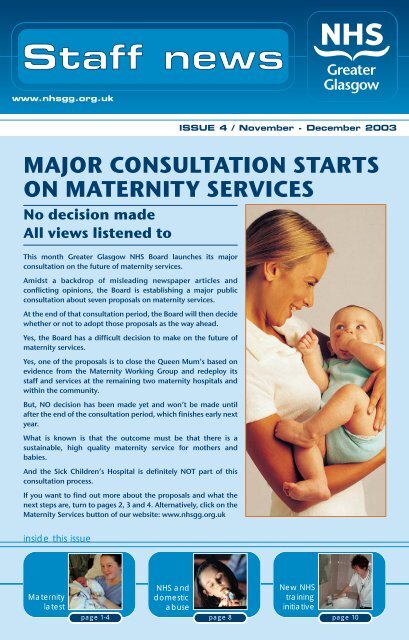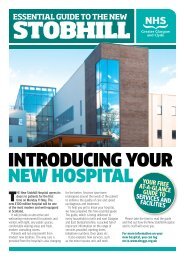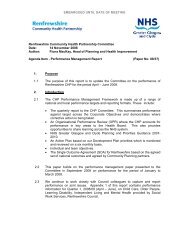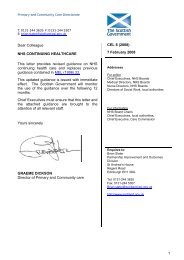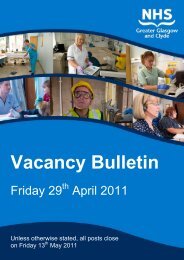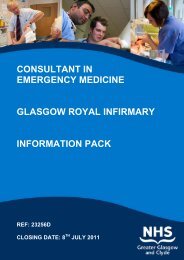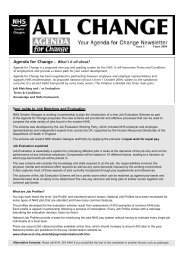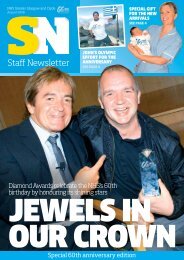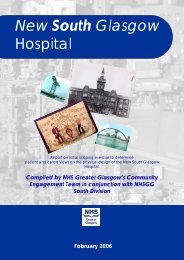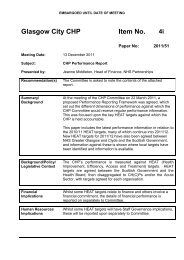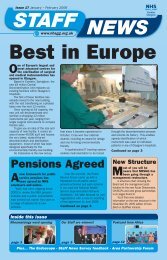GG NHS (Iss4) (1) - NHS Greater Glasgow and Clyde
GG NHS (Iss4) (1) - NHS Greater Glasgow and Clyde
GG NHS (Iss4) (1) - NHS Greater Glasgow and Clyde
You also want an ePaper? Increase the reach of your titles
YUMPU automatically turns print PDFs into web optimized ePapers that Google loves.
www.nhsgg.org.uk<br />
ISSUE 4 / November - December 2003<br />
MAJOR CONSULTATION STARTS<br />
ON MATERNITY SERVICES<br />
No decision made<br />
All views listened to<br />
This month <strong>Greater</strong> <strong>Glasgow</strong> <strong>NHS</strong> Board launches its major<br />
consultation on the future of maternity services.<br />
Amidst a backdrop of misleading newspaper articles <strong>and</strong><br />
conflicting opinions, the Board is establishing a major public<br />
consultation about seven proposals on maternity services.<br />
At the end of that consultation period, the Board will then decide<br />
whether or not to adopt those proposals as the way ahead.<br />
Yes, the Board has a difficult decision to make on the future of<br />
maternity services.<br />
Yes, one of the proposals is to close the Queen Mum’s based on<br />
evidence from the Maternity Working Group <strong>and</strong> redeploy its<br />
staff <strong>and</strong> services at the remaining two maternity hospitals <strong>and</strong><br />
within the community.<br />
But, NO decision has been made yet <strong>and</strong> won’t be made until<br />
after the end of the consultation period, which finishes early next<br />
year.<br />
What is known is that the outcome must be that there is a<br />
sustainable, high quality maternity service for mothers <strong>and</strong><br />
babies.<br />
And the Sick Children’s Hospital is definitely NOT part of this<br />
consultation process.<br />
If you want to find out more about the proposals <strong>and</strong> what the<br />
next steps are, turn to pages 2, 3 <strong>and</strong> 4. Alternatively, click on the<br />
Maternity Services button of our website: www.nhsgg.org.uk<br />
inside this issue<br />
Maternity<br />
latest<br />
page 1-4<br />
<strong>NHS</strong> <strong>and</strong><br />
domestic<br />
abuse<br />
page 8<br />
New <strong>NHS</strong><br />
training<br />
initiative<br />
page 10
p2<br />
WWW.<strong>NHS</strong><strong>GG</strong>.ORG.UK<br />
Tough decisions need<br />
to be made over future<br />
of Maternity Services<br />
<strong>Greater</strong> <strong>Glasgow</strong> <strong>NHS</strong> Board last month (October) agreed to<br />
consult with the public on a series of reports from a major<br />
pre-consultation exercise which includes the proposal to<br />
close the Queen Mother’s Hospital.<br />
The Board stressed that it would listen to all views <strong>and</strong><br />
that no final decision will be made until the end of this<br />
major consultation exercise, which started this month.<br />
<strong>NHS</strong> <strong>Greater</strong> <strong>Glasgow</strong> chairman, Professor Sir John<br />
Arbuthnott, again gave a personal assurance that the Royal<br />
Sick Children’s Hospital was not part of this consultation<br />
process, that investment will continue in the hospital <strong>and</strong> that<br />
it will continue to serve the needs of children for the next 15<br />
years. The Board agreed the future of the Sick Children’s<br />
Hospital would not be part of this consultation process.<br />
Sir John said: “Tumbling birth rates (the annual birth<br />
rate today is 3,500 less than it was 11 years ago),<br />
pressures on staff <strong>and</strong> changes in clinical organisation<br />
mean it is imperative that we make a decision soon on the<br />
future of maternity services.”<br />
The recommendations in the maternity services report<br />
were put forward following a three month preconsultation<br />
carried out by an independently chaired<br />
Modernising Maternity Services Working Group.<br />
Chaired by Professor Margaret Reid of the University of<br />
<strong>Glasgow</strong>, the Working Group gathered evidence from<br />
experts from across the UK, local health staff <strong>and</strong> other<br />
interested parties before making their recommendations.<br />
Reports from <strong>Glasgow</strong> midwives, following a midwifery<br />
workshop, <strong>and</strong> from MATNET, the maternity services<br />
users groups, were also submitted to the Board. Both<br />
organisations agreed that there should be two maternity<br />
hospitals instead of three, but did not come to a<br />
conclusion as to which hospital should close.<br />
Chief Executive Tom Divers said: “The reason why we<br />
had a pre-consultation was that we did not have a clear<br />
consensus from local clinicians as to the best way forward,<br />
ensuring safe services for both mothers <strong>and</strong> babies.<br />
However, there is a clear consensus that we need to cut<br />
the number of maternity hospitals from three to two, but<br />
opinions are divided as to which hospital should be<br />
closed. That’s why we asked Professor Reid’s group to<br />
look in detail at the complex clinical issues involved <strong>and</strong><br />
asked MATNET <strong>and</strong> the midwives to put forward their<br />
views on the issues.”<br />
Professor Michael Farthing, Board member, Dean of the<br />
Medical School <strong>and</strong> member of the Working Group, spoke<br />
about how evidence was gathered for the report.<br />
He said: “We heard evidence <strong>and</strong> we heard opinions <strong>and</strong><br />
based the outcome of the report on evidence. We found<br />
the evidence from the experts, who have no competing or<br />
conflicting interests, compelling. Seven out of nine agreed<br />
that moving services from the Queen Mother’s to the<br />
Southern General was the best way forward.”<br />
Dr Brian Cowan, <strong>Greater</strong> <strong>Glasgow</strong> <strong>NHS</strong> Board Medical<br />
Director, said: “Changes in medicine, pressures of<br />
ongoing training, New Deal for Junior Doctors <strong>and</strong> the<br />
Working Time Directive for Consultants mean that our<br />
clinicians can no longer sustain the current number of<br />
rotas. There’s a minimum amount of clinical staff<br />
required to cover each rota <strong>and</strong> skilled staff are needed 24<br />
hours a day, seven days a week. We have to make a<br />
difficult decision, but however difficult that decision will
WWW.<strong>NHS</strong><strong>GG</strong>.ORG.UK<br />
p3<br />
The Background<br />
In 1999, following widespread consultation with women’s<br />
groups <strong>and</strong> medical professionals, it was agreed two<br />
maternity units should serve <strong>Glasgow</strong>. Pressures on the<br />
midwifery, obstetric, neonatal <strong>and</strong> anaesthetic workforces<br />
are such that change is essential.<br />
It was understood that the Princess Royal would remain.<br />
However, local clinicians were unable to agree on which of<br />
the two remaining units would close.<br />
Both the Southern General <strong>and</strong> the Queen Mother’s are<br />
excellent hospitals <strong>and</strong> both provide a good range of local<br />
<strong>and</strong> regional services, but these services can be better<br />
provided with proper resources <strong>and</strong> staffing for the longterm<br />
from one site.<br />
be, it has to be made soon.”<br />
An extensive public consultation,<br />
which started at the beginning of<br />
November, will now take place on the<br />
proposals endorsed by the Board at<br />
October’s meeting. User friendly<br />
information leaflets on each key<br />
proposal will be made widely available<br />
with more detailed information<br />
accessible to those who want it. This<br />
will include all of the written material<br />
submitted to the Working Group for<br />
the pre-consultation period, policy<br />
guidance <strong>and</strong> the reports from<br />
MATNET <strong>and</strong> the midwifery group.<br />
Following the consultation, the<br />
Board will look at all the views<br />
gathered <strong>and</strong> make a decision on the<br />
shape of future services. A final<br />
decision will then be put forward for<br />
approval by the Minister for Health<br />
<strong>and</strong> Community Care.<br />
Earlier this year, the Board approached Professor<br />
Margaret Reid to be the independent chair of the<br />
Modernising Maternity Services Working Group. The<br />
group included three non-executive members of the Board<br />
– Peter Hamilton (former <strong>Greater</strong> <strong>Glasgow</strong> Health Council<br />
chairman), Professor Michael Farthing (Dean of <strong>Glasgow</strong><br />
University’s Medical School) <strong>and</strong> Rosslyn Crocket (Director<br />
of Nursing for the Primary Care Trust).<br />
Their remit was to look at the issue, gather evidence<br />
from a range of expert, health <strong>and</strong> other interested parties<br />
<strong>and</strong> then submit a report to the Board at a special Board<br />
meeting on October 7, 2003. Midwives <strong>and</strong><br />
representatives from the Maternity Services Users Network<br />
(MatNet) also submitted reports.<br />
Following that meeting, Board members took away all<br />
the reports for consideration <strong>and</strong> on October 21, 2003 met<br />
again to discuss the issue. It was then agreed that the<br />
Board would take seven proposals made in the report to<br />
public consultation.<br />
And that brings us up to where we are today: the public<br />
consultation began early this month (November) <strong>and</strong> will<br />
be thorough <strong>and</strong> inclusive, offering everyone from MSPs<br />
<strong>and</strong> maternity network groups to clinicians <strong>and</strong> <strong>Glasgow</strong><br />
mothers the chance to have their say on the future of<br />
maternity services in the city.
p4<br />
WWW.<strong>NHS</strong><strong>GG</strong>.ORG.UK<br />
Message from Our Chairman<br />
I wanted to write to all <strong>NHS</strong> staff to communicate directly<br />
the position on maternity services. I am very aware of<br />
intense <strong>and</strong> contradictory media coverage <strong>and</strong> it is<br />
important that all our staff have the correct message<br />
about the outcome of the Board meeting.<br />
We particularly recognise six points:<br />
• There is a strong consensus that with <strong>Greater</strong><br />
<strong>Glasgow</strong>’s falling birthrate <strong>and</strong> all of the clinical<br />
pressures, including working hours, <strong>and</strong> the need to<br />
provide round the clock cover, we must move from<br />
three delivery units to two;<br />
• Deciding on which hospital should be developed as<br />
our second delivery unit was always going to be<br />
difficult;<br />
• This is a key decision about a core part of our<br />
maternity services, for the vast majority of women,<br />
almost all of their care, during the normal process of<br />
pregnancy <strong>and</strong> birth, is provided by midwifery,<br />
medical <strong>and</strong> primary care staff, working in community<br />
settings. Our proposals for consultation reflect that<br />
reality <strong>and</strong> therefore include important questions<br />
about the development of community <strong>and</strong> midwifery<br />
services;<br />
• Recognising the difficulty of this decision, <strong>and</strong> with full<br />
commitment to public <strong>and</strong> staff involvement, we<br />
established a major preconsultation exercise;<br />
• There is a real <strong>and</strong> very difficult assessment to make on<br />
the best way to ensure safe services for women <strong>and</strong><br />
babies;<br />
• I am also very aware that this debate creates major<br />
uncertainty for staff providing services to which they<br />
are highly committed, about which they care deeply<br />
<strong>and</strong> of which we are very proud.<br />
At our meeting, after a long <strong>and</strong> difficult discussion, the<br />
Board agreed to consult on seven proposals. The Board<br />
also agreed that we should ensure that people can put<br />
alternative views, about the second delivery unit <strong>and</strong> any<br />
other issues.<br />
The seven proposals, based on the totality of the preconsultation<br />
work are:<br />
• Delivery services should be located in the new facilities<br />
at the PRMH <strong>and</strong> in high quality provision at the<br />
Southern General Hospital;<br />
• There should be greater consistency <strong>and</strong> co-ordination<br />
in the organisation of maternity services, with a<br />
<strong>Glasgow</strong> wide approach to service delivery;<br />
• The important quality of service issues identified in the<br />
pre-consultation process below need to be fully<br />
reflected in our final reorganisation of services;<br />
• Developing <strong>and</strong> improving community services will be<br />
a core part of our proposals for service change;<br />
• Our final reorganisation of services will include specific<br />
proposals to develop midwifery services which are<br />
central to the provision of high quality maternity care;<br />
• Fetal medicine services currently provided at QMH<br />
should be transferred to the PRMH providing a single<br />
consolidated service for the West of Scotl<strong>and</strong> <strong>and</strong><br />
including current national services provided at the QMH;<br />
• Our final modernisation proposals should clearly take<br />
account of access <strong>and</strong> transport issues, mainly by<br />
delivering as much service as possible in community<br />
settings.<br />
We will develop a range of clearly understood material,<br />
make available a whole range of background information<br />
<strong>and</strong> evidence.<br />
The consultation will include a range of questions<br />
enabling staff <strong>and</strong> other interests to express their views.<br />
We are committed to Partnership working <strong>and</strong> are<br />
committed to treating any staff affected by service<br />
change in <strong>Greater</strong> <strong>Glasgow</strong> fairly.<br />
If the Board recommends a restructuring of maternity<br />
services <strong>and</strong> this is approved by the Health Minister, all<br />
staff concerned should be assured their employment is<br />
safe <strong>and</strong> they will be redeployed within the service.<br />
I can assure staff who might be affected that we would<br />
want to ensure that we are able to offer you positive<br />
opportunities which reflect your skills <strong>and</strong> aspirations. If<br />
you have any immediate concerns about your own<br />
situation please talk to your Human Resources<br />
Department who will be able to offer you initial advice.<br />
This consultation exercise will not include any<br />
proposals to shift the Royal Hospital for Sick Children.<br />
Our absolute aim must be that the reorganisation of<br />
maternity services delivers safe care to women <strong>and</strong> their<br />
babies.<br />
During the consultation process we will keep all staff<br />
up-to-date on what is happening. For the moment please<br />
if you have any queries about this letter - you can contact<br />
your Communications Team on:<br />
Board: North Trust: South Trust:<br />
Communications S<strong>and</strong>ra Moir, Gavin Barclay,<br />
Team,<br />
tel: 0141 201 4429 tel: 0141 201 4314 tel: 0141 201 1257<br />
Yorkhill:<br />
PCT:<br />
Ryan Taylor, Elsbeth Campbell,<br />
tel: 0141 201 0833 tel: 0141 211 3891<br />
Or access the Board papers <strong>and</strong> preconsultation material<br />
through our website, www.nhsgg.org.uk<br />
Or you can send your views the Staff News Partnership<br />
Editorial Team to: staffnews@nhsgg.scot.nhs.uk<br />
Yours sincerely,<br />
PROFESSOR SIR JOHN P. ARBUTHNOTT<br />
Chairman<br />
A copy of a letter to staff from Professor Sir John<br />
Arbuthnott’s has been circulated to staff already <strong>and</strong> is<br />
available on www.nhsgg.org.uk (click on the maternity<br />
services button).
WWW.<strong>NHS</strong><strong>GG</strong>.ORG.UK<br />
p5<br />
Successful AGM for <strong>NHS</strong><strong>GG</strong><br />
Staff, voluntary organisations, members of<br />
user groups <strong>and</strong> other interested parties<br />
flocked to the Royal Concert Hall last month<br />
(October) to <strong>NHS</strong><strong>GG</strong>’s Annual General<br />
Meeting.<br />
For the first time, the AGM was held in an<br />
‘open space’ format which allowed a number<br />
of stalls to be set up representing some of the<br />
wide variety of specialities within <strong>NHS</strong><strong>GG</strong>.<br />
This included a st<strong>and</strong> from Yorkhill, the<br />
Primary Care Trust, older people’s services,<br />
children’s health, maternity services,<br />
women’s health, anti-smoking, breastfeeding,<br />
mental health <strong>and</strong> others.<br />
<strong>NHS</strong><strong>GG</strong> Chairman, Professor Sir John<br />
Arbuthnott opened the meeting <strong>and</strong> spoke<br />
about a range of issues including progress on<br />
the Acute Services modernisation, the<br />
Beatson <strong>and</strong> health improvement successes.<br />
He also congratulated staff for their success in<br />
meeting Government targets.<br />
Chief Executive Tom Divers then spoke<br />
about the challenges ahead for <strong>NHS</strong><strong>GG</strong>,<br />
including the review of maternity services.<br />
Following his talk, he took questions <strong>and</strong><br />
answers from the floor.<br />
The AGM ended with the opportunity for<br />
delegates to w<strong>and</strong>er round the st<strong>and</strong>s <strong>and</strong><br />
chat to staff.<br />
Mr Divers said: “It was a very successful AGM<br />
<strong>and</strong> I’d like to thank staff involved for all their<br />
hard work in putting it together.”
p6<br />
WWW.<strong>NHS</strong><strong>GG</strong>.ORG.UK<br />
Conferencing in <strong>Glasgow</strong> -<br />
Be a part of the success story<br />
Busy health workers don’t always have the time to spend<br />
organising conferences <strong>and</strong> events.<br />
So, it’s good to know that when the time comes to<br />
organise your event, <strong>Greater</strong> <strong>Glasgow</strong> & <strong>Clyde</strong> Valley<br />
Tourist Board’s Ambassador Programme is there to help.<br />
Laura Beaton from <strong>Greater</strong> <strong>Glasgow</strong> & <strong>Clyde</strong> Valley<br />
Tourist Board explains: “The <strong>Glasgow</strong> Ambassador<br />
Programme was first established in 1990 <strong>and</strong> has played<br />
a vital role in attracting conferences to the city ever since<br />
with members recruited mainly from academic, medical,<br />
business <strong>and</strong> professional institutions.<br />
“Today there are more than 1,000 <strong>Glasgow</strong><br />
Ambassadors who last year helped secure 58 conferences<br />
for the city representing £31 million in local economic<br />
benefit. This impressive figure accounted for<br />
approximately 43% of the total conference sales secured<br />
by <strong>Greater</strong> <strong>Glasgow</strong> & <strong>Clyde</strong> Valley Tourist Board in<br />
2002/2003.<br />
“If you are already involved in co-ordinating meetings<br />
in the city with colleagues from the UK <strong>and</strong> overseas in<br />
your own specialised field of healthcare - or are about to<br />
be - why not give the programme a try<br />
“Complementing the Royal College of Physicians <strong>and</strong><br />
Surgeons’ comprehensive conference support service, I<br />
would be delighted to provide additional assistance for<br />
busy <strong>NHS</strong><strong>GG</strong> staff hosting conferences elsewhere in the<br />
city with elements such as free bid preparation, civic<br />
recognition <strong>and</strong> delegate literature.<br />
“If we don’t already know about your conference – no<br />
matter how small – <strong>GG</strong>&CVTB would love to hear from<br />
you. Please tell us about your event <strong>and</strong> help put <strong>Glasgow</strong><br />
on the conventions map!”<br />
Contact Laura Beaton at <strong>GG</strong>&CVTB for more<br />
information <strong>and</strong> free assistance on tel: 0141 566 4026 or<br />
email: laura.beaton@seeglasgow.com<br />
<strong>GG</strong>&CVTB is a publicly funded organisation which<br />
offers free <strong>and</strong> impartial conference support services on<br />
behalf of the city to those wishing to become involved in<br />
organising a conference locally. <strong>NHS</strong> staff can link in to<br />
the Ambassador extranet on the www.seeglasgow.com<br />
website by clicking on the Ambassadors key on the front<br />
page <strong>and</strong> completing the pro forma.<br />
NEARLY 7,000 RESPOND TO STAFF SURVEY<br />
The staff survey has now been collected with 6,936 of you responding.<br />
Your views will be collated <strong>and</strong> analysed <strong>and</strong> we’ll publish a flavour of what you said in the next<br />
edition of the Staff News.<br />
Helen Ostrycharz, chair of the Staff Survey Partnership Working Group who organised getting the<br />
survey out to staff, said: “I’d like to thank members of the working group, the staff who held<br />
roadshows <strong>and</strong> the payroll staff who stapled nearly 34,000 surveys to payslips for all their hard work.<br />
Thanks too, to those members of staff who took the time to fill in the survey <strong>and</strong> send it back to us.<br />
Your contribution will help us formulate future policies.”<br />
Olivia Cornacchia, Area Partnership Forum Co-ordinator, commented: “The results of the survey will<br />
be collated <strong>and</strong> presented to the Area Partnership Forum after which each Trust will make the<br />
information available to staff in a variety of ways. We’ll be discussing the survey results in a future<br />
edition of the Staff News <strong>and</strong> all Trust Partnership Forums will have the Staff Survey on their agenda.”<br />
And Staff News would like to congratulate Theresa Coyle from Eastvale Resource Centre’s Elderly<br />
Team who guessed 6,900 people would respond <strong>and</strong> was nearest to the actual figure. She wins a<br />
week’s holiday for two at the Hotel Panorama Marine in Es Cana, Ibiza.
WWW.<strong>NHS</strong><strong>GG</strong>.ORG.UK<br />
p7<br />
The Endoscope<br />
Fried Bassett<br />
The Bulletin, the<br />
Beatson Oncology<br />
Centre’s staff<br />
magazine, recently<br />
ran a story about<br />
the retirement of<br />
Dr Bob Lawson,<br />
Head<br />
of<br />
Radiotherapy<br />
Physics. However,<br />
readers were horrified to be presented with photographic<br />
evidence of the Doc’s culpability in morally dubious<br />
medical experiments. The photo (above) clearly shows Dr<br />
Lawson endeavouring to clone Bertie Bassett, the famed<br />
frontman for Liquorice Allsorts. Bertie’s missing features<br />
suggest that the experiment appears to have gone a bit<br />
awry. It is understood that Dr Lawson has not been<br />
daunted by his failure <strong>and</strong> his retirement project is to<br />
attempt to cross breed a penny dainty with a wildebeest.<br />
Tra la la, la la la…<br />
This is a staff magazine <strong>and</strong> The<br />
Endoscope is keen to ensure that the<br />
rights of all staff to openness <strong>and</strong><br />
fairness are respected. Except for senior<br />
managers, of course. Therefore, in this<br />
bumper edition, we want all staff to join Ian<br />
h<strong>and</strong>s in slagging off the high heid yins<br />
by participating in a competition for the<br />
fabulous prize of a box of nearly new<br />
(non-Dr Lawsonised) Liquorice Allsorts.<br />
The staff of the Primary Care Trust are<br />
in something of a qu<strong>and</strong>ary. The Chief<br />
Executive, Ian Reid is considered by one Drooper<br />
faction to bear more than a passing<br />
resemblance to the multi-media<br />
phenomenon that is the boy wizard,<br />
Harry Potter. Now, apart from the<br />
specs <strong>and</strong> the youthful demeanour,<br />
there is a good argument for this – Mr<br />
Reid was well known in his previous Harry<br />
incarnation of HR Director for making staff disappear.<br />
However, those other staff remaining feel that he bears a<br />
greater resemblance to Drooper, one of that crazy<br />
quartet of child entertainers in animal skins from 1960’s<br />
<strong>and</strong> 70’s TV, The Banana Splits. Drooper was the one<br />
that didn’t make a honking noise or speak with a wet<br />
lisp, which is also a pretty fair description of Ian Reid.<br />
So, now it’s up to you to decide – Harry Potter or<br />
Drooper – Aye or naw Answers to The Endoscope. The<br />
best one gets the sweeties (except the blue <strong>and</strong> pink<br />
knobbly ones).<br />
Mullet on skully – it’s as cheap as chips<br />
Oh, the horror. The Endoscope<br />
speaks not of the Evening Times’<br />
one-organ crusade to save Yorkhill<br />
from property developers, nor of<br />
its gratuitous use of Dorothy-Grace<br />
Elder, but of its disturbing <strong>and</strong><br />
wholly unnecessary publication of<br />
<strong>NHS</strong> Board members’ photos on<br />
October 14, 2003. And they didn’t<br />
even do it for Halloween!<br />
But it was the outing of <strong>NHS</strong><strong>GG</strong>’s Director of<br />
Communications, Ally McLaws, which did most harm to<br />
the psyche of innocent readers. Using a photo from the<br />
archives, the Toerag’s graphics team inadvertently<br />
revealed that Mr McLaws once possessed a hairstyle<br />
which no-one, least of all him, thought would see the<br />
light of day in the 21st Century. We refer, of course, to<br />
the ‘Mullet’ – a style which seems oddly popular in<br />
Middle America <strong>and</strong> <strong>NHS</strong> imaging departments but is<br />
somewhat outré elsewhere.<br />
This complicates matters for The Endoscope; we had<br />
been saving Mr McLaws for a future edition, as many<br />
colleagues had noted his current <strong>and</strong> unfortunate<br />
resemblance to ‘cheap as chips’ dodgy furniture expert<br />
David Dickinson <strong>and</strong> Eastenders cheeky chappy Alfie<br />
Moon. However, the Mullet shot truly confirms that Ally<br />
McLaws is an entire cornucopia of C-list celeb lookalike<br />
possibilities, for in it he is the exact double of GMTV’s<br />
Eamonn Holmes, no less, that nice Irish boy who does<br />
Songs of Praise when Aled Jones isn’t available.<br />
Well it’s down to you again, dear readers: David<br />
Dickinson, Alfie Moon or Eamonn Holmes – Aye or naw<br />
The best answer gets a fish supper.<br />
Tash of terror<br />
One last senior manager<br />
photo, but this time it is no<br />
lookalike as, surely, no-one<br />
else looks like this. Happy<br />
50th birthday, Robert<br />
Calderwood, head honcho at<br />
the South Trust. In honour of<br />
this special event, we take<br />
great pleasure in publishing a<br />
photo of Bob in which his nose<br />
appears to be being assailed<br />
by something hairy <strong>and</strong> unpleasant. Yes, Ally McLaws’<br />
Mullet escaped <strong>and</strong> did its best to savage Bob – that he’s<br />
lived this long is testament to his strong nerves <strong>and</strong><br />
unbreakable resolve. Anything that perennial Southside<br />
hospital protestors can throw him is pretty tame<br />
compared to the mad Mullet.
p8<br />
WWW.<strong>NHS</strong><strong>GG</strong>.ORG.UK<br />
Recognition<br />
for Women’s<br />
Health Team<br />
The work of the <strong>NHS</strong><strong>GG</strong>’s<br />
Women’s Health Team<br />
<strong>and</strong> its partners has been<br />
recognised by the World<br />
Health Organisation<br />
(WHO).<br />
Following four years as<br />
a WHO Collaborating<br />
Centre for Women’s<br />
Health, the team based<br />
at Dalian House has been<br />
officially re-designated as<br />
a WHO Collaborating<br />
Centre for Policy <strong>and</strong><br />
Practice Development in<br />
Women’s Health <strong>and</strong><br />
Gender Mainstreaming.<br />
The <strong>Glasgow</strong> centre is<br />
unique as it is a<br />
collaborating partnership<br />
between organisations<br />
including <strong>Glasgow</strong><br />
Healthy City Partnership,<br />
the S<strong>and</strong>yford Initiative<br />
<strong>and</strong> <strong>Glasgow</strong> University.<br />
Work in the pipeline for<br />
the team will include<br />
continuing to develop<br />
<strong>and</strong> carry out research<br />
with WHO’s Women <strong>and</strong><br />
Health Development<br />
Programme, while<br />
supporting research in<br />
WHO’s member<br />
countries. Analysing <strong>and</strong><br />
documenting successful<br />
lifespan <strong>and</strong> health<br />
promotion approaches<br />
will be coupled with<br />
involvement in clinical<br />
research <strong>and</strong> care.<br />
Anyone interested in<br />
learning more about the<br />
collaborating centres can<br />
visit<br />
http://whocc.who.int<br />
Making Domestic Abuse<br />
Like many taboo subjects, domestic abuse against women is<br />
as prevalent as ever <strong>and</strong> the Health Service is determined to The Scottish<br />
improve staff awareness <strong>and</strong> build on successful support Executive’s<br />
services.<br />
hard hitting<br />
Shocking research has revealed that between one in three campaign<br />
women will experience abuse from a partner <strong>and</strong> one in five<br />
showed it’s<br />
from an ex partner during the course of their lives.<br />
not just the<br />
The consequences of this are manifested in the physical,<br />
emotional <strong>and</strong> mental health of women <strong>and</strong> children, <strong>and</strong> woman who<br />
include higher rates of gynaecological <strong>and</strong> chronic pain suffers.<br />
problems, as well as depression, anxiety <strong>and</strong> substance<br />
abuse.<br />
In recognition of the pivotal role of the <strong>NHS</strong> in tackling the<br />
issue, a Scottish Executive report was released in April to<br />
clarify what is expected of health workers in identifying <strong>and</strong><br />
responding to the needs of women experiencing domestic<br />
abuse.<br />
The guidance is a further development of the Strategy to<br />
Address Domestic Abuse in Scotl<strong>and</strong>, which was produced by<br />
the Scottish Executive in 2000. A more concise booklet was<br />
also recently released for all health staff.<br />
One of the requirements of the Scottish guidance is for a<br />
lead director, assisted by an operational adviser, to take<br />
responsibility at a local level. In <strong>Glasgow</strong>, these representatives are Director of<br />
Public Health Dr Harry Burns <strong>and</strong> Programme Manager (Gender-Based<br />
Violence) Katie Cosgrove.<br />
Katie explained: “We have established a Gender-Based Violence Planning<br />
<strong>and</strong> Implementation Group to co-ordinate work across <strong>NHS</strong><strong>GG</strong> to improve the<br />
healthcare response to violence against women.<br />
“The focus of our work includes other forms of abuse such as childhood<br />
sexual abuse, sexual assault, prostitution <strong>and</strong> domestic abuse.”<br />
So what is being done to address the issue across <strong>NHS</strong><strong>GG</strong><br />
Dr Harry Burns explained: “The Board has been developing a programme to<br />
address the Health Service implications of gender-based violence for a number<br />
of years, as part of its commitment to the <strong>Glasgow</strong> Women’s Health Policy.<br />
“The programme is led by the Women’s Health Team in the Department of<br />
Public Health <strong>and</strong> is in conjunction with the Trusts <strong>and</strong> other public support<br />
agencies.”<br />
The latest developments include:<br />
• A rolling programme of training in domestic abuse <strong>and</strong> shared domestic<br />
abuse protocols in Accident <strong>and</strong> Emergency departments;<br />
• A Link Midwife project which has a dedicated midwife in each maternity<br />
setting to support staff <strong>and</strong> develop training programmes. This aims to build<br />
on midwives’ awareness raising study days that cover issues such as the link<br />
between domestic abuse <strong>and</strong> postnatal depression;<br />
• Additional counselling provision <strong>and</strong> support, given by the Centre for<br />
Women’s Health at the S<strong>and</strong>yford Initiative, for women who have<br />
experienced gender-based violence;<br />
• The Childhood Sexual Abuse <strong>and</strong> Homelessness Demonstration Project,<br />
which aims to end the cycle that sees these problems go h<strong>and</strong>-in-h<strong>and</strong>;<br />
• A review of the Psychology Directorate’s response to survivors of childhood<br />
sexual abuse;<br />
• Research into the mental health needs of women in refuge, in conjunction<br />
with Lanarkshire <strong>and</strong> Argyll & <strong>Clyde</strong> <strong>NHS</strong> Boards, <strong>and</strong> Scottish Women’s Aid;<br />
• A Women’s Mental Health Project established in Bridgeton LHCC to provide<br />
a direct service for women experiencing mild to moderate mental health
WWW.<strong>NHS</strong><strong>GG</strong>.ORG.UK<br />
p9<br />
an <strong>NHS</strong> Priority<br />
Providing a<br />
caring approach<br />
0800 027 1234<br />
www.domesticabuse.co.uk<br />
difficulties, including those caused by violence;<br />
• A research project with the Starting Well initiative to<br />
explore the role of Health Visitors in responding to<br />
domestic abuse against women;<br />
• A strategic <strong>and</strong> operational homelessness project on<br />
gender-based violence, to ensure the issue is integrated<br />
with the work of the Homelessness Partnership;<br />
• A project working with women abused in prostitution,<br />
funded by <strong>NHS</strong><strong>GG</strong> <strong>and</strong> managed by <strong>Glasgow</strong> Rape<br />
Crisis.<br />
<strong>NHS</strong><strong>GG</strong> is being represented on multi agency partnerships<br />
in gender-based violence within five local authority areas.<br />
The Health Service is also represented in the Routes Out of<br />
Prostitution Social Inclusion Partnership.<br />
Staff who wish to find out more about the issue <strong>and</strong> the<br />
part they can play, can contact Katie Cosgrove on 0141<br />
201 4971.<br />
Where can staff go if they are being abused<br />
Domestic abuse cuts across all boundaries <strong>and</strong> there is<br />
recognition from <strong>NHS</strong> <strong>Greater</strong> <strong>Glasgow</strong> that staff seeking<br />
advice on this painful issue need to be able to do so in the<br />
knowledge that their problems will be dealt with in the<br />
strictest confidence <strong>and</strong> with sensitivity.<br />
With this in mind, Yorkhill Trust have taken their<br />
programme one step further <strong>and</strong> introduced a Domestic<br />
Abuse Policy <strong>and</strong> process for staff. The Occupational<br />
Health <strong>and</strong> Safety Sub-Group of the Area Partnership<br />
Forum is looking at this as a model with a view to making<br />
advice on this matter available throughout <strong>Greater</strong><br />
<strong>Glasgow</strong>.<br />
In the meantime, if you are experiencing domestic<br />
abuse, you can contact your local HR office or the Employee<br />
Counselling Service on 0800 435 768. Alternatively phone<br />
the national helpline number on 0800 027 1234.<br />
Strathclyde Police is committed to providing a<br />
professional, sensitive <strong>and</strong> caring approach to<br />
victims of Domestic Abuse. Every Police Officer <strong>and</strong><br />
Force Support Officer is responsible for ensuring the<br />
safety of the victim <strong>and</strong> family in all reported<br />
incidents of Domestic Abuse. This is of paramount<br />
importance <strong>and</strong> is our first priority.<br />
This Policy seeks to ensure the provision of the<br />
best possible service to victims who are especially<br />
vulnerable, often isolated <strong>and</strong> frequently in danger.<br />
Our commitment is to:<br />
• adopt a victim-centred approach;<br />
• investigate thoroughly;<br />
• actively pursue perpetrators; <strong>and</strong>,<br />
• keep victims <strong>and</strong> their families safe.<br />
Initial responsibility rests with the individual officer<br />
attending at the scene of a reported incident. The<br />
personal commitment of all officers extends to:<br />
• the full investigation of every incident;<br />
• where sufficiency of evidence exists, to<br />
arrest/detain the offender;<br />
• full recording of every incident;<br />
• provision of support <strong>and</strong> information <strong>and</strong> the<br />
referral of the victim to a support agency;<br />
• continued contact with the victim as appropriate<br />
to the individual circumstances; <strong>and</strong>,<br />
• work with other agencies to provide solutions for<br />
victims <strong>and</strong> families.<br />
This Policy underlines the commitment of every<br />
Police Officer <strong>and</strong> Force Support Officer of<br />
Strathclyde Police to continue to make all efforts<br />
possible to support survivors of Domestic Abuse<br />
<strong>and</strong> to bring to justice those responsible.<br />
In an emergency phone 999 <strong>and</strong> ask for the Police.<br />
In a non-emergency situation, you can contact your<br />
local Police Office or Women’s Aid – their telephone<br />
numbers are in the telephone book. Alternatively,<br />
you can find out more by accessing the following<br />
web-sites:<br />
www.strathclyde.police.uk or<br />
www.womensaid.org.uk
p10<br />
WWW.<strong>NHS</strong><strong>GG</strong>.ORG.UK<br />
Ambitious Project Helps<br />
Unemployed Into Work<br />
<strong>NHS</strong> <strong>Greater</strong> <strong>Glasgow</strong> is about to embark on an ambitious<br />
new pilot initiative that aims to help unemployed people<br />
gain the skills they need for working in the Health<br />
Service.<br />
The Working for Health in <strong>Greater</strong> <strong>Glasgow</strong> project<br />
offers unemployed people a six-week training<br />
programme to help them get on the first rung of the <strong>NHS</strong><br />
employment ladder.<br />
Trainees will be given the opportunity to gain practical<br />
experience working as support workers within acute<br />
hospital sites across the city. This will be in a range of<br />
different areas including: portering, nursing assistants,<br />
hotel services, medical laboratory assistants <strong>and</strong> domestic<br />
services.<br />
By shadowing health workers, they’ll not only pick up<br />
vocational skills <strong>and</strong> find out what it’s like to work for the<br />
Health Service, but, project managers hope, be<br />
encouraged to apply for jobs within <strong>NHS</strong><strong>GG</strong>.<br />
At the end of their six weeks, the trainees will be<br />
Domestic services is one of the vital<br />
support services within <strong>NHS</strong><strong>GG</strong>.<br />
guaranteed an interview for support worker vacancies<br />
that arise throughout the system.<br />
Led by a team of professionals from <strong>NHS</strong><strong>GG</strong>, JobCentre<br />
Plus <strong>and</strong> the Local Economic Development Companies’<br />
Network, the Working for Health programme has been<br />
developed with Human Resources <strong>and</strong> Training &<br />
Development departments across <strong>NHS</strong><strong>GG</strong>.<br />
<strong>NHS</strong><strong>GG</strong>’s Mark McAllister, who is part of the project<br />
coordination team, said: “This new programme will give<br />
unemployed people a six week ‘induction’ into working<br />
for the Health Service. We hope that by providing this<br />
support we will be helping them get on the first rung of<br />
the employment ladder.<br />
“At the end of the training period, we will hopefully<br />
have a group of trainees who are ‘job ready’ <strong>and</strong> able to<br />
compete on an equal footing with other c<strong>and</strong>idates<br />
interviewing for jobs. Staff recruitment <strong>and</strong> retention is<br />
an issue for <strong>NHS</strong><strong>GG</strong> <strong>and</strong> we hope that this may be a way<br />
of filling some support services vacancies.”<br />
Mark revealed they were looking to frontline support<br />
staff to help make this programme a success. “The world<br />
of work is often a challenging place for those of us in<br />
employment, but for someone who hasn’t had a job for a<br />
while it can be a daunting experience.<br />
“This programme will only be a success with the help<br />
<strong>and</strong> support of those workers who will be acting as<br />
mentors to the trainees. We’re looking for your assistance<br />
to help us give unemployed people the opportunity to<br />
learn for work. You won’t be asked to do anything other<br />
than act as a supervisor, giving trainees h<strong>and</strong>s-on<br />
experience of the type of work you do. It’s a good<br />
opportunity for those staff who are looking to gain a bit<br />
of experience themselves in supervising other employees.<br />
“This is also a way for managers to see people ‘in<br />
action’ before interviewing them for positions. It will give<br />
them a good idea about how suitable the trainee is for<br />
filling vacant posts.”<br />
Although, the programme is seen as an important<br />
contribution to the recruitment of staff into support<br />
worker positions, there is also a strong health improvement<br />
aspect to the programme. The intention is to recruit<br />
participants from some of the most deprived areas in the<br />
city, <strong>and</strong> provide individuals with the appropriate support<br />
through the programme to make a positive contribution to
WWW.<strong>NHS</strong><strong>GG</strong>.ORG.UK<br />
p11<br />
WORKING TOWARDS<br />
THE FUTURE<br />
Portering is an option<br />
open to trainees.<br />
improving their own health <strong>and</strong> wellbeing.<br />
Mark said: “Whether it’s a parent returning to work,<br />
someone returning from a illness or an individual who<br />
needs some re-skilling, there is a likelihood that they will<br />
need some support.<br />
“Through providing that support, the programme<br />
hopes to ensure that the potential health benefits from<br />
working are realised. These might include new social<br />
networks, improved confidence <strong>and</strong> self-esteem as well as<br />
financial gain, providing trainees with the resources to<br />
make more informed choices relating to lifestyle <strong>and</strong><br />
being able to make a difference to their life<br />
circumstances.”<br />
The Working for Health group is hoping to appoint a<br />
training provider in early November. The training<br />
programme devised will not only provide participants<br />
with the necessary vocational skills but also seek to<br />
develop their all round employability through improving<br />
communication <strong>and</strong> trainees’ confidence. The first<br />
trainees will start their programme shortly after that.<br />
In the current financial year, a minimum of 36<br />
unemployed people will be offered places on the training<br />
programme. Open to people who are eligible for New<br />
Deal or Training for Work, the programme will initially be<br />
a pilot programme with the intention to roll the<br />
programme out in the next financial year.<br />
Around 200 employees from West of Scotl<strong>and</strong> <strong>NHS</strong><br />
swarmed to Celtic Park on October 3, not to cheer on<br />
the team <strong>and</strong> scoff a few pies, but to attend the<br />
successful Workforce Development Convention.<br />
Hosted by guest speaker Minister for Health <strong>and</strong><br />
Community Care Malcolm Chisholm, the event was<br />
designed to:<br />
• Bring individuals with a leadership role or interest<br />
in Workforce Development together on a West of<br />
Scotl<strong>and</strong> basis<br />
• Formally launch the Regional Workforce<br />
Development project<br />
• Develop partnerships across <strong>NHS</strong>, education <strong>and</strong><br />
employment enterprise<br />
• Update the audience on practical examples of<br />
Workforce Development across the <strong>NHS</strong><br />
• Promote Care Careers<br />
• Harness the expertise <strong>and</strong> experience of delegates<br />
to creatively identify <strong>and</strong> explore recruitment,<br />
retention <strong>and</strong> development priorities <strong>and</strong> actions<br />
for the coming six months<br />
The event kicked off with Malcolm Chisholm’s<br />
keynote address to an audience of approximately 230<br />
delegates from West of Scotl<strong>and</strong> <strong>NHS</strong> organisations<br />
<strong>and</strong> educational <strong>and</strong> employment partnership<br />
agencies.<br />
Chairman for the day, Ian Reid, Chief Executive of<br />
the PCT <strong>and</strong> West of Scotl<strong>and</strong> Workforce Development<br />
Champion, was supported by fellow speakers from<br />
the PCT, the North Trust <strong>and</strong> Lothian <strong>NHS</strong> Trust.<br />
Mr Reid said: “The event was an all-round success.<br />
We were delighted with the number of staff who<br />
attended <strong>and</strong> benefited from it.<br />
“It gave people from several regions of the Health<br />
Service, <strong>and</strong> from partner organisations across<br />
Scotl<strong>and</strong>, the chance to put names to faces <strong>and</strong> look<br />
to the future of work within the <strong>NHS</strong>.”<br />
The Care Careers initiative was formally launched<br />
by <strong>NHS</strong><strong>GG</strong> Chairman Professor Sir John Arbuthnott in<br />
the afternoon <strong>and</strong> the rest of the event included<br />
popular workshops based on subjects such as<br />
recruitment, staff retention <strong>and</strong> work development.<br />
Funding totalling £500,000 from the Scottish<br />
Executive will support Workforce Development in the<br />
West of Scotl<strong>and</strong> over the next two years.
p12<br />
WWW.<strong>NHS</strong><strong>GG</strong>.ORG.UK<br />
Positively Parenting<br />
No-one teaches you how to become a parent, but there<br />
you are, nine months down the line, with a crying babe<br />
<strong>and</strong> a look of shock on your face.<br />
And then the little tike starts to grow up <strong>and</strong> little<br />
h<strong>and</strong>s get where they shouldn’t <strong>and</strong> before you know it<br />
you’re in a battle of wills with your toddler as you fight for<br />
supremacy.<br />
Don’t worry though, that’s not the best of it. You’ve<br />
still got a good few years left of fighting <strong>and</strong> behavioural<br />
issues before your beloved offspring ups <strong>and</strong> leaves to<br />
make their own way in life.<br />
Okay, so this is painting an horrific image of family life<br />
that may sound over-the-top to some, but this is reality<br />
for some parents who simply can’t control their<br />
misbehaving children.<br />
So what can you, the parent, do about it Well, you<br />
could sign up for one of the Positive Parenting<br />
Programme classes that are now available to <strong>NHS</strong><strong>GG</strong> staff.<br />
Brought to <strong>Greater</strong> <strong>Glasgow</strong> through the Starting Well<br />
initiative, the Programme, which is also known as Triple P,<br />
aims to help parents become better at dealing with<br />
disobedience <strong>and</strong> problems surrounding child rearing.<br />
For instance, does your baby cry all the time Triple P<br />
can give you tips on how to manage the crying <strong>and</strong> what<br />
you as parents can do to lessen the stress of having a<br />
crying baby. There’s also advice on dealing with older<br />
children from disobedient toddlers to teenage tantrums.<br />
Programme Coordinator, Claire Cassidy, said: “Being a<br />
parent is not easy. It’s a full time job, but, unlike other<br />
jobs, you don’t get any training for it. Triple P is about<br />
giving parents, especially working parents, the support<br />
<strong>and</strong> advice they need to manage their child’s behaviour.<br />
“Triple P is not just for parents with unruly children, it’s<br />
for everyone who has any worries about bringing up their<br />
children. The course is completely research based using<br />
techniques that have been proven to work.<br />
“The programme has already been highly successful with<br />
a number of <strong>NHS</strong><strong>GG</strong> staff having gone through already.”<br />
The classes are open to all <strong>and</strong> completely free. To get<br />
on the waiting list, contact Programme Coordinator<br />
Claire Cassidy on 0141 201 4444 or<br />
claire.cassidy@gghb.scot.nhs.uk<br />
The Positive Parenting Programme or Triple P was<br />
developed by a team led by psychologist Dr Matt S<strong>and</strong>ers,<br />
Director of the Parenting <strong>and</strong> Family Support Centre at<br />
the University of Queensl<strong>and</strong> in the late 70s. There are<br />
five levels to the programme <strong>and</strong> parents can choose<br />
whether they want to do the basic parenting level or go<br />
on to take part in the entire course.<br />
Starting Well works to ensure that <strong>Glasgow</strong> families<br />
have the necessary skills <strong>and</strong> additional practical<br />
assistance to give their children the best possible start in<br />
life.<br />
The Project is led by <strong>Glasgow</strong> Healthy Cities Partnership<br />
in partnership with <strong>NHS</strong> <strong>Greater</strong> <strong>Glasgow</strong> <strong>and</strong> works with<br />
a range of other statutory, voluntary <strong>and</strong> academic<br />
organisations <strong>and</strong> agencies in the Gorbals, Govanhill,<br />
North Toryglen <strong>and</strong> the East of <strong>Glasgow</strong>.<br />
The Starting Well team is made up of Health Visitors,<br />
Health Support Workers (who are lay workers drawn from<br />
local communities), Community Support Facilitators <strong>and</strong><br />
Community Nursery Nurses who work together to<br />
promote children’s health <strong>and</strong> to improve opportunities<br />
for young children to socialise with other children.<br />
Gathering Momentum<br />
The health inequality gap between the poor <strong>and</strong> the wealthy in <strong>Glasgow</strong> is narrowing, but it remains<br />
difficult to pinpoint the ‘X factor’ of why <strong>Glasgow</strong>’s health record remains amongst the worst in the world.<br />
The establishment of a Centre for Population Health in <strong>Glasgow</strong> to look at what that ‘X factor’ may be is<br />
well underway.<br />
Developed by <strong>NHS</strong> <strong>Greater</strong> <strong>Glasgow</strong>, <strong>Glasgow</strong> City Council <strong>and</strong> the University of <strong>Glasgow</strong>, the three<br />
organisations are continuing to work together to ensure the Centre is up-<strong>and</strong>-running by April 2004.<br />
Malcolm Chisholm, Minister for Health <strong>and</strong> Community Care has made a commitment to fund the Centre<br />
<strong>and</strong> a Project Management Team has been appointed.<br />
We’ll bring you more news on this exciting project in future editions of the Staff News. Watch this<br />
space!!!!!!!
WWW.<strong>NHS</strong><strong>GG</strong>.ORG.UK<br />
p13<br />
Celia’s Care<br />
Helps Eye<br />
Patients<br />
Cope Better<br />
Celia Traynor<br />
A Patient Support Worker is at the forefront of providing<br />
advice <strong>and</strong> support to patients who are losing their sight.<br />
Celia Traynor runs the Gartnavel Eye Clinic’s Patient<br />
Support Programme which has helped more than 620<br />
people since it started in November 2002.<br />
The programme is the first of its kind for eye clinics in<br />
Scotl<strong>and</strong> <strong>and</strong> Celia is the only full-time dedicated visual<br />
impairment worker providing this service.<br />
She said: “The Patient Support Programme helps take<br />
away some of the confusion, fear <strong>and</strong> anxiety that<br />
surrounds sight loss by offering patients advice where <strong>and</strong><br />
when it is needed including social, emotional <strong>and</strong><br />
functional support. This allows patients to get on as best<br />
they can with everyday living.<br />
“Many of the patients I see are upset <strong>and</strong> find coping<br />
with daily tasks increasingly difficult.<br />
“A lot of the time they just need someone to talk to,<br />
someone who underst<strong>and</strong>s what it is they are experiencing<br />
<strong>and</strong> someone who can help them make the most of their<br />
condition.<br />
“It is the simple things that can change people’s lives for<br />
the better. A woman cried when I showed her an easy to<br />
read clock, she just assumed she would never be able to<br />
read the time again.”<br />
The Patient Support Programme has produced<br />
magnificent results from almost its first day <strong>and</strong> the culture<br />
change needed to merge medical <strong>and</strong> social care for a<br />
patient has changed remarkably since the service began.<br />
Although Celia works alone she could not do her job<br />
without the tremendous support of the consultants,<br />
ophthalmologists, optometrists <strong>and</strong> nursing staff in the<br />
department.<br />
One of them, Staff Nurse Agbo said: “We could have<br />
done with this type of service 30 years ago. Celia <strong>and</strong> her<br />
Patient Support Programme is an added bonus to the<br />
department.”<br />
NEW CONSULTANTS FOR BEATSON<br />
The Beatson Oncology Centre is very pleased to announce the<br />
appointment of a new Consultant Clinical Oncologist.<br />
Dr Azmat Sadozye, who trained at the West of Scotl<strong>and</strong><br />
Cancer Centre, will take up his new post at the beginning of<br />
December. Discussions are also underway with three other<br />
Consultant Oncologists, following a worldwide recruitment<br />
campaign.<br />
“This is the news we have all been waiting for,” says Beatson<br />
Oncology Centre Medical Director, Professor Alan Rodger.<br />
“More Consultants will at long last start to ease the pressure on<br />
the rest of the team, <strong>and</strong> ultimately improve the experience for<br />
our patients.”<br />
Welcoming Dr Sadozye’s appointment Tom Divers, Chief<br />
Executive of <strong>NHS</strong> <strong>Greater</strong> <strong>Glasgow</strong>, says: “Consultant<br />
Oncologists are in worldwide dem<strong>and</strong>. The response to the<br />
latest round of advertising at the Beatson proves all the hard<br />
work that has gone in to developing the West of Scotl<strong>and</strong><br />
Cancer Centre is being recognised.”<br />
Discussions continue with three other Consultants, two of<br />
whom currently work overseas. Another advertisement for a<br />
Consultant Medical Oncologist is due to appear in the<br />
professional journals at the end of October.<br />
In December 2001, the Beatson<br />
Oncology Centre was allocated an<br />
extra £3.2m a year by the Scottish<br />
Executive Health Department to<br />
increase staffing levels.<br />
Now, the Centre is funded for 24<br />
Clinical Oncologists (specialists in<br />
chemotherapy <strong>and</strong> radiotherapy<br />
treatments). Seventeen are currently<br />
in post, <strong>and</strong> they are being<br />
supported by a locum Consultant. Dr<br />
Sadyoze’s appointment means there<br />
are still six substantive vacancies in<br />
this staff group.<br />
Similarly, there is funding for<br />
eight Medical Oncologists<br />
(chemotherapy specialists). Five are<br />
currently in post, supported by an<br />
additional locum Consultant.<br />
The drive to recruit further<br />
Consultants for the Centre<br />
continues.
p14<br />
WWW.<strong>NHS</strong><strong>GG</strong>.ORG.UK<br />
Disease, Outbreaks <strong>and</strong><br />
Environmental Hazards<br />
It’s all in a day’s work for SCIEH<br />
Most people outside the specialist<br />
world of Public Health Medicine<br />
will probably not have heard of the<br />
Scottish Centre for Infection <strong>and</strong><br />
Environmental Health (SCIEH).<br />
Based in offices in Clifton Place,<br />
Sauchiehall Street, <strong>Glasgow</strong>, the<br />
staff of SCIEH, which is a division<br />
of the Common Services Agency,<br />
provide a range of specialist backup <strong>and</strong> support for <strong>NHS</strong><br />
Boards <strong>and</strong> Local Authorities in Scotl<strong>and</strong>.<br />
SCIEH exists to improve the health of the Scottish<br />
population by providing the best possible information<br />
<strong>and</strong> expert support to practitioners, policy makers <strong>and</strong><br />
others on infectious <strong>and</strong> environmental hazards.<br />
SCIEH began life following an outbreak of typhoid in<br />
Aberdeen in 1964, which affected more than 500 people.<br />
It was originally known as the Communicable Diseases<br />
Campylobacter<br />
Scotl<strong>and</strong> Unit when it was set up in 1969 in Ruchill<br />
Hospital in <strong>Glasgow</strong>.<br />
Tim Brett, General Manager of SCIEH, said: “During the<br />
1980s’ it was recognised that it was important to have a<br />
co-ordinated national response to environmental health<br />
issues <strong>and</strong> as a result a new unit Environmental Health<br />
Scotl<strong>and</strong> was set up in 1989.<br />
“In 1993, the two Units CSDU <strong>and</strong> EHSU amalgamated<br />
to become the Scottish Centre for Infection <strong>and</strong><br />
Environmental Health. It moved from Ruchill Hospital to<br />
Clifton House in 1998.<br />
“SCIEH’s prime function is the monitoring <strong>and</strong><br />
surveillance of communicable diseases <strong>and</strong><br />
environmental hazards <strong>and</strong> the provision of operational<br />
support to deal with these.<br />
“Many people might have thought that with the<br />
advances in science <strong>and</strong> medicine that the traditional<br />
communicable diseases such as polio, measles <strong>and</strong><br />
tuberculosis were in decline, but over the<br />
last 20 years new diseases such as<br />
HIV/AIDS have appeared so that the<br />
threat from infectious diseases remains as<br />
high as ever <strong>and</strong> the recent worldwide<br />
outbreak of SARS has shown just how<br />
vulnerable the world community is to new<br />
forms of disease.”<br />
SCIEH’s work is wide <strong>and</strong> varied <strong>and</strong><br />
they’ve been involved in the incident<br />
teams formed to deal with issues such as<br />
Cryptosporidium, E Coli <strong>and</strong> Meningitis.<br />
They were also part of the team<br />
investigating the first human case of<br />
rabies in Scotl<strong>and</strong> in 2002.<br />
Zoonotic diseases, the transfer of<br />
disease from animals to man remains an<br />
important public health issue <strong>and</strong> SCIEH<br />
has amongst its expert staff a veterinary<br />
surgeon, as well as experts in<br />
environmental health, public health<br />
medicine, nursing <strong>and</strong> a range of<br />
scientists with different backgrounds.<br />
One of SCIEH’s other sections deals with<br />
travel medicine <strong>and</strong> as more of us are
WWW.<strong>NHS</strong><strong>GG</strong>.ORG.UK<br />
p15<br />
This is what E-Coli<br />
looks like under<br />
the microscope<br />
Developing<br />
Community Health<br />
Partnerships<br />
straphylococcusaureus<br />
Hepatitis C<br />
travelling abroad for holidays or business the risk of<br />
picking up an infection whilst away is one that people<br />
need to consider. The Travel Health section of SCIEH has<br />
developed an on-line travel information service for<br />
Primary Care Practitioners called TRAVAX <strong>and</strong> a system for<br />
public access called FIT FOR TRAVEL.<br />
As well as surveillance <strong>and</strong> operational support, SCIEH<br />
also plays a significant role in research. Current projects<br />
involve looking at the likely number of patients who will<br />
require treatment for hepatitis as well as the incidence of<br />
HIV, environmental studies such as a lead in water study<br />
looking at the use of lead solder in new houses in<br />
Scotl<strong>and</strong>.<br />
SCIEH also has a major role to play in education <strong>and</strong><br />
training. This is particularly important for professionals<br />
in public health <strong>and</strong> environmental health, <strong>and</strong> specialist<br />
courses are provided by the Health Care Acquired<br />
Infection Section, the Travel Medicine Section <strong>and</strong><br />
general awareness sessions for staff who are taking part in<br />
on-call arrangements for public health emergencies in<br />
Scotl<strong>and</strong>.<br />
For the future, SCIEH is likely to become part of a new<br />
Scottish Health Protection body. It will continue to play<br />
an important role in protecting the health of the<br />
population <strong>and</strong> supporting the work of front-line<br />
professionals in health boards <strong>and</strong> local authorities.<br />
For more information, see their website:<br />
www.show.scot.nhs.uk/scieh<br />
The Health White Paper Partnership for Care, which was<br />
published in February 2003, set out the future direction<br />
<strong>and</strong> priorities for the <strong>NHS</strong> in Scotl<strong>and</strong>.<br />
It proposes a number of organisational changes to<br />
improve services for patients including the development<br />
of Community Health Partnerships (CHPs). These will<br />
replace Local Health Care Cooperatives <strong>and</strong> bring about<br />
even greater partnership working between health<br />
professionals <strong>and</strong> planning partners such as Social Work<br />
Services.<br />
The CHPs will bring together <strong>and</strong> build on the current<br />
work underway to develop primary care services, deliver<br />
health improvement <strong>and</strong> take forward the Joint Future<br />
agenda with local authorities.<br />
CHPs will also ensure that local community based<br />
health services, including those for children, are more<br />
closely integrated with hospital services. Although CHPs<br />
are expected to evolve from our existing Local Health Care<br />
Co-operatives, they will be new <strong>and</strong> distinct organisations<br />
with wider responsibilities <strong>and</strong> greater influence.<br />
Each <strong>NHS</strong> Health Board has been given the flexibility to<br />
develop CHPs in line with local needs <strong>and</strong> in <strong>NHS</strong> <strong>Greater</strong><br />
<strong>Glasgow</strong> a Steering Group has recently been formed to<br />
develop proposals on the principles for establishing CHPs<br />
by December 2003.<br />
Ian Reid, Chief Executive of the PCT <strong>and</strong> joint chair of<br />
the Steering Group, said: “Principles will be discussed <strong>and</strong><br />
agreed with relevant local authority colleagues before<br />
being considered by the <strong>GG</strong><strong>NHS</strong> Board in early 2004.<br />
“Formal consultation will then take place before final<br />
decisions are taken in April 2004. Given the scale of<br />
change required, proposals are expected to be<br />
implemented over a 12-month development period with<br />
the new CHPs becoming fully operational in April 2005,<br />
although final timescales will be dependant on new<br />
legislation being passed by the Scottish Executive.”<br />
Further briefing updates <strong>and</strong> events are planned over<br />
the coming months to ensure staff, organisations <strong>and</strong><br />
individuals with an interest in the development of CHPs<br />
are kept informed <strong>and</strong> have the opportunity to contribute<br />
at an early stage.<br />
A copy of the <strong>NHS</strong><strong>GG</strong> consultation paper on the<br />
implementation of Partnership for Care, which includes<br />
details of our plans to develop CHPs, <strong>and</strong> updates from the<br />
Steering Group meetings will also be available on the <strong>NHS</strong><br />
<strong>Greater</strong> <strong>Glasgow</strong> website (www.nhsgg.org.uk).<br />
In the meantime, if there are any questions or issues<br />
which you would like to raise or if you wish to discuss the<br />
development of CHPs in more detail then please contact<br />
Elsbeth Campbell, Head of Communications, <strong>Greater</strong><br />
<strong>Glasgow</strong> Primary Care <strong>NHS</strong> Trust on 0141 211 3891 or<br />
email elsbeth.campbell@gartnavel.glacomen.scot.nhs.uk
p16<br />
WWW.<strong>NHS</strong><strong>GG</strong>.ORG.UK<br />
Drugs <strong>and</strong> Alcohol<br />
Are you or any of your family members<br />
affected by drugs or alcohol problems<br />
Help is on h<strong>and</strong> via two national<br />
information <strong>and</strong> advice lines.<br />
If you feel you are affected by<br />
a drug problem, information<br />
<strong>and</strong> advice is available<br />
through the Know the Score<br />
drugs helpline. The line is open<br />
24 hours a day, seven days a week:<br />
0800 776 600.<br />
Many people experience problems with alcohol <strong>and</strong> other<br />
drugs, it’s nothing to be ashamed about <strong>and</strong> the earlier<br />
you get help the better.<br />
People who regularly use drugs such as heroin,<br />
tranquillisers, amphetamines or cocaine can develop short<br />
term <strong>and</strong> long term health <strong>and</strong> other problems in their<br />
lives.<br />
You may wish to contact your GP or other helping<br />
agencies if:<br />
• You feel you are regularly drinking to get drunk or<br />
using drugs regularly;<br />
• You are beginning to think about some of the problems<br />
in your life that might be linked with your drinking or<br />
drug use;<br />
• You are experiencing withdrawal symptoms when you<br />
stop drinking or using e.g. shakes, sweats, anxiety,<br />
paranoia, amongst others;<br />
• You are self- medicating e.g. using alcohol or other<br />
drugs to cope with pain, to sleep or to cope with your<br />
problems.<br />
If it’s alcohol that’s the problem, contact the national<br />
alcohol information line on 0800 917 8282 (open 9-<br />
11pm on weekdays or 24 hours at the weekends).<br />
Drinking alcohol is something that most of us do without<br />
any serious problems. However, we need to remember<br />
that it is a depressant drug that should be used with care.<br />
There are guidelines for safer drinking that include:<br />
• Sticking to safer limits, beyond which you can risk<br />
damage to your health long term. These are 3-4 units a<br />
day for men <strong>and</strong> 2-3 for women;<br />
• Aim to give your body a break <strong>and</strong> reduce the habit of<br />
drinking by having 2-3 drink free days a week;<br />
• Be very aware of mixing alcohol with other drugsincluding<br />
prescribed medication;<br />
• Be careful where you use alcohol <strong>and</strong> avoid drinking if<br />
you are operating machinery or driving;<br />
• Think about whether you regularly drink to get drunk<br />
or binge.<br />
There are many supporting agencies <strong>and</strong> organisations<br />
working in the <strong>Greater</strong> <strong>Glasgow</strong> area to help people<br />
affected by drug or alcohol issues. The helplines can put<br />
you in touch with local agencies in your area which can<br />
offer on-going support <strong>and</strong> help for drug <strong>and</strong> alcohol<br />
problems.<br />
Staff News<br />
Written by staff for staff with the full support of the Partnership Forum.<br />
If you’d like to send an article, letter, photograph or comment to us…..<br />
Send them via<br />
our new email address:<br />
staffnews@nhsgg.scot.nhs.uk<br />
or<br />
Send them to:<br />
Olivia Cornacchia, Staff News,<br />
<strong>NHS</strong> <strong>Greater</strong> <strong>Glasgow</strong>,<br />
Dalian House, 350 St Vincent<br />
Street, <strong>Glasgow</strong> G3 8YZ.


